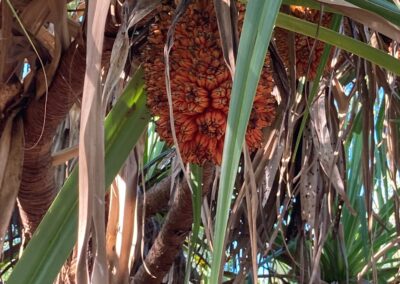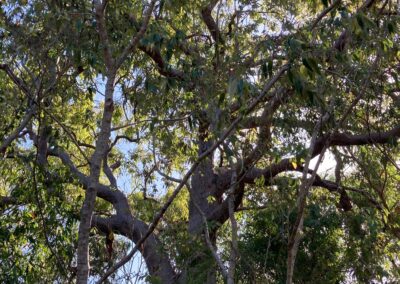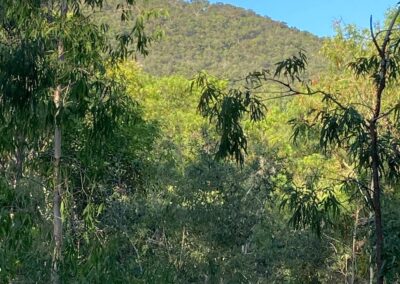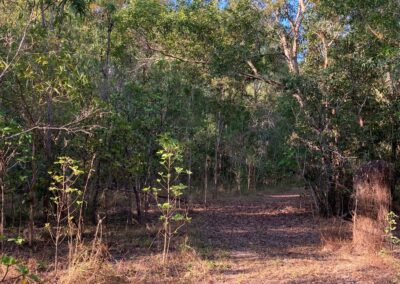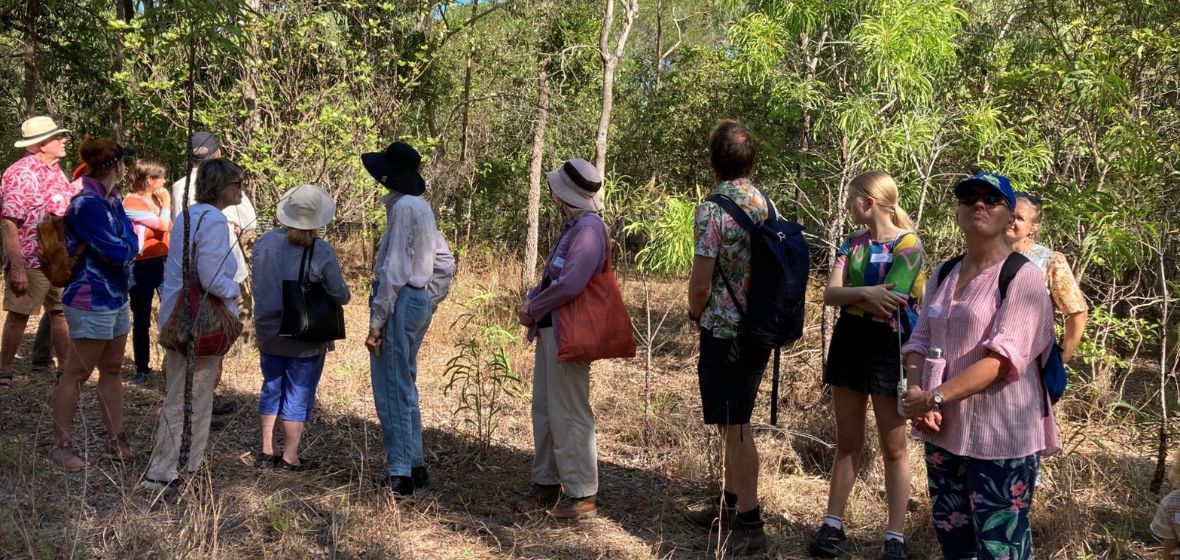
A walk around the lower loop of Claude’s Block. (All photos: Liz Downes)
18 October 2022 | Author: Liz Downes
It is estimated that there are between 800 and 900 resident koalas on Yunbenun (Magnetic Island) — making the island one of Australia’s most significant remaining refuges for these endangered marsupials. Last week Wildlife Queensland Townsville Branch member Liz Downes headed to Yunbenun to celebrate the Magnetic Island Nature Care Association’s successful campaign to purchase Claude’s Block — an important lowland area that will be placed under permanent protection and will give the island’s resident koalas safe access to their preferred eucalypts growing in the richest, deepest soils on the island.
Less than 18 months ago the Magnetic Island Nature Care Association (MINCA) launched its bid to raise $400,000 for the purchase of the 5.33 ha block of land, roughly halfway along the West Point Road, known as Claude’s Block. If successful this extraordinarily ambitious plan would see a valuable area of native bushland (and key koala habitat) linked to other protected, publicly and privately-owned land nearby, as well as to the National Park, whose border runs along the back of the block.
To an outsider, it seemed an impossible task, but by reaching, and indeed exceeding, the total in just a few weeks, they showed what the power of bold and optimistic thinking, combined with expert community outreach, can achieve. Something surely that all conservation groups should aspire to.
Celebrating a rare opportunity
On 15 October MINCA members, supporters and donors were invited to the celebrations — and what a celebration it was! Over a hundred people turned up by various means, with those travelling from the mainland being chauffeured from the ferry terminal to the block, where an enticing mix of exploration, education and entertainment had been planned.
Some of MINCA’s key figures (thanks Gethin, Charlie, George and Peter) took us in groups around different parts of the property, explaining how the hydrology, terrain and soil composition influence the vegetation. For example, towards the back of the block we saw how a grove of tall paperbarks has grown up in a shallow depression where water accumulates after rain; closer to the road on an ancient dune, formed thousands of years ago when sea levels were higher, pandanus are thriving on the sandy soil.
It was astonishing to learn that, up until the mid-1990s, the entire block had been stripped of almost every tree and was basically reduced to bare pasture, stocked with cattle and water buffalo for a CSIRO research project. Once that ended and the cattle were removed, nature was allowed to revegetate at her own remarkably rapid pace.
Dominant tree species from the Corymbia, Eucalyptus and Melaleuca genera now form a tall shady canopy over most of the property. One impressive old bloodwood, which had escaped a previous clearing, caused me to contemplate how those poor cattle must have loved its shade. Many smaller plants, like lilies (Crinum sp.) and the native gardenia, are also now thriving.
Unsurprisingly, weeds introduced by the cattle also flourished but evidence of MINCA’s eradication efforts could be seen everywhere. It was a beautiful, inspiring and indeed a joyful experience to wander the tracks in the late afternoon light, against the backdrop of the steep, wooded hillsides, in the company of such knowledgeable and enthusiastic guides.
Koalas among the greatest beneficiaries
In between the walks, we had beautiful music from the gifted young cellist, Evan Hodgson, and a talk from a passionate local birder, Chris Corbett, before enjoying a wonderful supper accompanied by a great local trio, Random Sass. As the stars came out Peter regaled us with hilarious tales of West Point adventures from his (misspent?) youth, Chris challenged our knowledge of nocturnal bird calls, while Charlie, Gethin and George gave us more of the human and natural history of the Island and this very special slice of it. For anyone who thought the Forts area was the place most favoured by the Island’s koalas — think again! A recent survey showed that the area with the greatest population density was right around us. Given the parlous state of this iconic animal elsewhere in Australia, efforts to protect them and their habitat on Magnetic Island take on national significance.
Finally, Random Sass was back to wrap up the night and get young and old up on their feet and dancing. All credit to MINCA for a fabulous event, superbly organised. The long-ago words of the late John Sinclair, that champion of K’gari (Fraser Island) and many other battles, came back to me: Conservation is fun! Yes, despite the setbacks and hard grind, it certainly can be — but it is also hope. And MINCA has shown us what both look like. Well done — and thank you!
You can read more about MINCA, their work generally, and Claude’s Block with many more photographs on their website. MINCA membership is not confined to islanders, so regardless of whether or not you are able to participate in their activities directly, do consider giving them your support as a member or donor.

